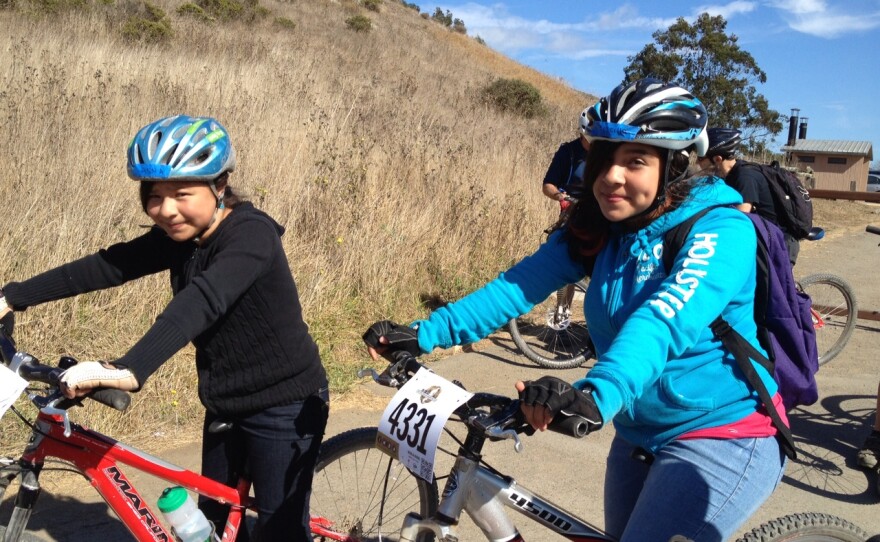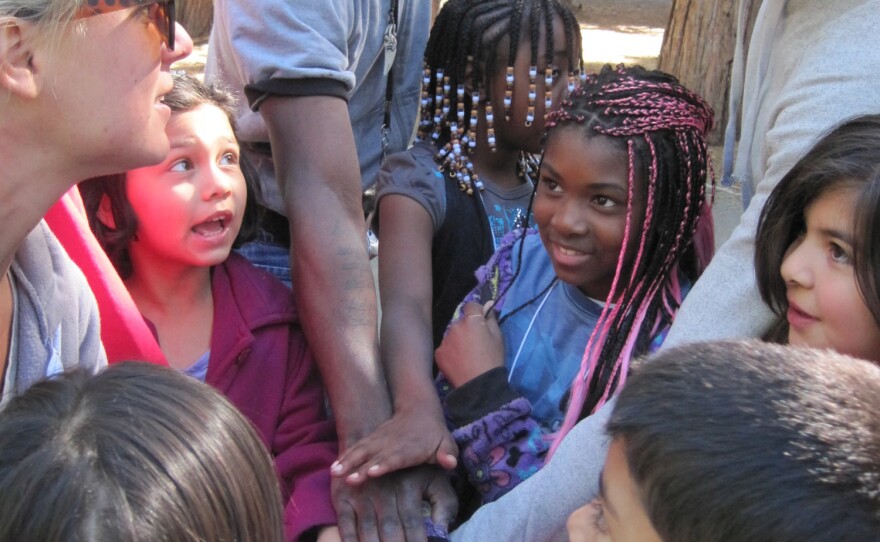Natasha Mahia, a student at El Dorado elementary school in Visitacion Valley, is one of ROCK’s biggest fans. ROCK stands for Real Options for City Kids, an after-school and mentoring program for youth in Visitacion Valley.
“I love ROCK,” Natasha says, “because I get to do all kinds of activities, cooking, art, sports...”
Natasha’s mentor and ROCK director, Curt Yagi, is trying to get her to her next activity. It’s a really hands on program. Even ROCK’s executive director, is a tutor and mentor. When Yagi isn’t fundraising, he’s leading music workshops and helping Natasha with her Math homework.
Inside the cafeteria a group of students are hard at work with some volunteers, constructing architectural models of bungalows and the Interstate 80.
The kids get to choose what they want to work on: sports, music, or arts and crafts. But everybody has to do power hour. That’s code for homework time.
“I think if you have an activity called homework help it’s not so attractive,” says Yagi, “but if you have something called Power Hour it’s much more appealing.”
ROCK was founded 20 years ago by a woman named Michelle Grow. At first it served just one elementary school and the programing was built around sports. Grow wanted to work with young kids, in schools, doing something she loved. Two decades later, Yagi says he’s seen it change a lot.
“The program became so popular that as time went by the elementary school kids became middle schoolers, but we didn’t have anything available for them. So we thought, middle school there’s lots of sports opportunities, but there’s no outdoor adventure opportunities so we did that, they loved it.”
Then the kids got to high school and ROCK added community service projects, job opportunities and overnight camping trips.
“We just want to be with them as much as we can,” says Yagi.
That’s really important in Visitacion Valley, because of how tough it can be.
“Visitacion Valley is probably one of the last family neighborhoods,” Yagi says. “It’s a really nice community, it definitely has lots of sun, and on the downside it’s a challenge for kids to grow up here too. In terms of crime and poverty and different things like that.”
Many of ROCK’s attendees grow up in the Sunnydale-Valesco housing project. It was originally built as temporary military housing in World War II. It’s had very few updates since. Nightly police patrols are a familiar sight.
Natasha Mahia lives on the other side of the neighborhood from Sunnydale, but she says it’s hard to be a kid on her street, too.
“It’s very quiet there but it’s loud over the street because they have parties. Music, and people going like this nn tss nntss nntss. They’re trying to rap, ch ch chck, they go like that”
Monique Garrett, who goes by Mo, says Sunnydale housing projects is really what Visitacion Valley is known for. She started going to ROCK when she was eight.
“I feel like my only positive experience was attending ROCK,” says Mo, “It made me feel like people did care about our neighborhood.”
Mo says Curt used to come to her basketball games, and other ROCK mentors helped her move into college. Now she’s twenty four, and works for ROCK as a recreation leader. But she could have turned out differently.
“A lot of my friends ended up in jail, they ended up pregnant at an early age, dropping out of school. I think ROCK had a really big role in the way I turned out,” says Garrett.
It could end up having a big impact on the way Natasha Mahia and her friends turn out too. Yagi’s aim is to keep them engaged, after school and on the weekends, feeling confident and encouraged at school.
“When you talk to kids when they’re young, especially first and second grade they’re full of energy and they’re not as affected by what’s around them and there’s still that hope,” Yagi says, “and I think that’s probably what keeps me going, is there’s still that hope within a lot of them”
It’s Curt Yagi’s job to preserve that hope and energy. So by the time they start making choices about what path they might end up on, they have a few more options.








